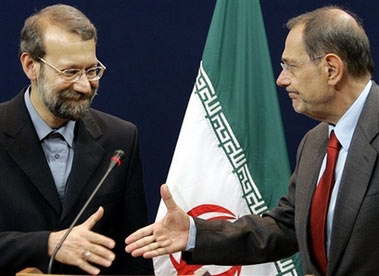
EU foreign policy chief Javier Solana (R)
shakes hands with Iran's top nuclear negotiator Ali Larijani at the
European Council headquarters after a bilateral meeting in Brussels, July
11, 2006. Larijani warned Tuesday that talks on his country's atomic
program will be a 'long process,' urging patience and dashing hopes of a
breakthrough on the international standoff.
[AP] |
Iran ruled out responding this week to
international incentives to suspend its nuclear program, saying Tuesday that the
offer contains too many "ambiguities."
Ali Larijani, Tehran's top nuclear negotiator, said after meeting with
European Union foreign policy chief Javier Solana that the "ambiguities must be
removed first in order to have serious talks."
His comments dashed any hope that that Iran would meet a Wednesday deadline
on a six-nation offer of incentives aimed at dissuading Tehran from uranium
enrichment.
Foreign ministers from the six powers that crafted the proposal, the five
permanent UN Security Council members plus Germany, are to meet Wednesday in
Paris. The six are pushing for an agreement before the July 15-17 Group of Eight
summit in Russia.
Solana's spokeswoman said he was disappointed with the talks and "not
satisfied" with the lack of progress.
"We continue to be committed to a negotiated solution," Cristina Gallach
said, adding that the EU and others "wanted a reply, the sooner the better."
An EU official said Iran had not asked specific questions addressing what
Tehran has called concerns about ambiguities.
The official said that Solana did not give Tehran a deadline to make up its
mind on the incentives package but indicated that the EU was growing impatient.
"It's now the fifth week after the offer was presented," said the official,
who spoke on condition of anonymity due to the sensitivity of the talks.
Iran repeatedly has said it will not respond to the offer before August and
Larijani warned that talks on his country's atomic program will be a "long
process."
The Iranian negotiator refused to elaborate on the nature of the perceived
ambiguities, but he called on the European Union, United States, Russia and
others to be patient.
"I see no reason for being skeptical. We must allow more time for
negotiations to work," Larijani told reporters after meeting with Solana. "All
matters must be discussed and all concerns must be addressed."
Larijani warned the United States and others against sending the matter to
the Security Council for possible sanctions, calling it "the wrong way" to solve
the impasse.
"It is not difficult to disrupt negotiations by making harsh comments,"
Larijani said.
Some Western officials have threatened to restart efforts to punish Iran
through possible sanctions unless Tehran stops uranium enrichment and agrees to
talks by Wednesday.
Enrichment can produce fuel for a civilian reactor or fissile material for a
bomb. The U.S. and its allies suspect Iran's nuclear program is cover for a
weapons program, despite Tehran's repeated denials.
Solana offered little comment on the meeting, which lasted around four hours.
"We will make (an) analysis and we will see how to proceed," Solana said.
Neither side gave an indication on whether Iran was moving toward accepting
the package of incentives offered last month. Iranian officials in Tehran
reiterated that they need clarification on the proposal before giving any formal
response.
Solana had been hoping for a positive reply from Larijani on the offer of
economic and trade rewards, nuclear expertise and reactors in exchange for a
pledge by Iran to suspend uranium enrichment activities during nuclear talks.
Solana said he would brief foreign ministers from the United States, Russia,
China, France, Germany and Britain on Wednesday in Paris on his talks with the
Iranians.
Several dozen members of exiled Iranian opposition groups rallied outside the
meeting, calling for the EU to cut off contacts with Tehran and support the
opposition in its efforts to replace Iran's government.
"The clerical regime is trying to buy time to build up an atomic arsenal,"
said Mehdi Nobari, an organizer of the protest. "They are playing with Europe,
and the EU should stop appeasing them."
A top French official ruled out setting a new deadline for Iran during the
upcoming G-8 summit since China will not be present at that meeting.
The diplomat, who spoke on condition of anonymity because of the sensitivity
of the talks, said France was reluctant to push for any ultimatums, calling them
counterproductive.
In Washington, British Foreign Secretary Margaret Beckett said the incentive
package merits "a warm and ready welcome" from Iran.
Secretary of State Condoleezza Rice raised anew the possibility of punishment
but gave no specifics.
"We hope that the Iranians choose the path before them for cooperation, but
of course we can always return to the other path should we need to," Rice
said.